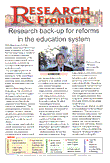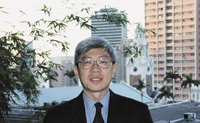 |
enables quality decisions.

The conventional protocol of producing a research proposal, applying for funds, assembling a team of assistants, researching, submitting reports and producing articles for publication is still very important.
But says Prof Cheng, Pro-Vice Chancellor at The University of Hong Kong, the accelerating pace of change in today's world is driving societies towards more "instant forms of knowledge generation in fact-finding, analysis and rational deliberation." The traditional notion of research, he comments, should be extended towards these quicker knowledge-generating forms "so we can more easily catch up with the pace of change."
At the moment, simple and often crucial research can be a victim of convention; because its cost is relatively low compared to traditional more in-depth research and, because it may not be publishable as an academic article, it is unlikely to be put forward as set piece research for funding. (However this could change if, as found elsewhere, potential users of the research fund it themselves).
Prof Cheng believes research should be used a lot more in Hong Kong policy making. He added: "Research gives us solid, dependable information that enables quality decisions. It's important to help form sound policies."
He suggested that research would be useful to help policy-making on a number of findings in the Education Commission's latest report which advocates a change in Hong Kong's approach to education towards "learning for life."
On the curriculum he said that, apart from competencies, Hong Kong employers were often critical that locally-produced workers lacked innovation, creativity, questioning, communication and teamworking abilities. Hong Kong needs research to find out how best to teach these capacities, he said.
Another area for research Prof Cheng suggested is to find out what level of English competency Hong Kong needs, producing benchmarks that would fit Hong Kong's unique social makeup.
In China, he said, detailed research is being produced on the teaching of mathematics. "They are trying to find out what is really useful, what is only mathematically interesting but not useful although should be retained, and what should not be retained, what will become obsolete because of changing technology, and what will become unimportant because of the change in nature of an individual's working life."